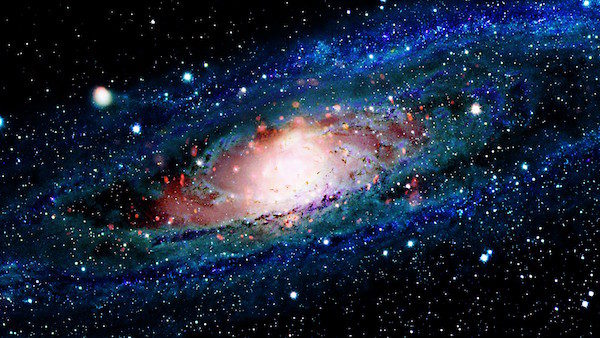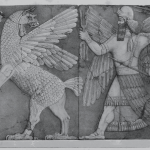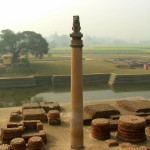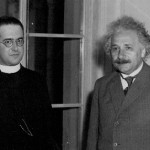10 Keys on Faith and Science for Christians and Atheists
by Dr. Stacy Trasancos
Filed under Christianity and Science

On one hand, there are marvelous discourses in institutions of higher learning about the ways theology illuminates scientific ideas and, likewise, how science deepens faith. Theologians, philosophers, and scientists come together and talk, even if everyone is not a person of faith. On the other hand, the public presentation of faith and science, mostly on the internet, is a tale of incessant conflict because anyone can pose as an expert on religion or science, despite being nonreligious or never having worked as a scientist.
The following ten imperatives were originally written for a Christian audience to bridge this gap between public pessimism and optimism among scholars. I have replaced some text with commentary for atheist readers at Strange Notions. The original is at National Catholic Register.
1. Profess the Creed in confidence.
To Christians: If you pray “I believe in one God, the Father almighty, maker of heaven and earth, of all things visible and invisible,” then your faith comes first. For you, Christianity is not a hypothesis or a theory; it is everything, a pervasive worldview. We do not call some things intelligently designed and declare other things mere random chances of nature, as if nature were not the handiwork of God, but we see everything as a consistently interacting totality, a Creation, including every last particle and force governed by the laws of physics.
To atheists: Of course you do not pray the Creed, but hopefully you can appreciate the logical consistency of an all-or-none Christian worldview. Anything less falls short of a belief in a Creator of all things. If you point that deficiency out to Christians who make distinctions between “random, chance nature” and “intelligent design,” you have a valid point.
2. Know your faith, and let it guide your reasoning.
To Christians: “Dogmas are lights along the path of faith; they illuminate it and make it secure” (Catechism of the Catholic Church 89). You cannot navigate science in the light of faith if you do not have the lights on, so to speak. There are a number of sources for finding Church teaching. Besides the Catechism, Ludwig Ott’s Fundamentals of Catholic Dogma and Heinrich Denzinger’s Sources of Catholic Dogma are trusted resources.
Be aware of the hierarchy of truths (CCC 90). Distinguish between infallible dogmas and theological opinions. Most of the discussion happens where theological opinions are proposed and science can increase comprehension. How do we talk about the emergence and evolution of life? How do we describe the unity of body and mind? How do we think about the human person compared to other creatures?
To atheists: The difference in dogma and doctrine is poorly understood. There are certain dogmas that Christians truly cannot deny, for that would logically lead to a denial of other doctrines. Everything derives from the Holy Trinity and the Incarnation. We do not hold true to the existence of the soul, the beginning of Creation, and the miracles of Christ blindly in faith, but rather as a reasoned assent in faith, not unlike the reasoned assent students make when they are taught about atoms.
For me, it came down to a moment of decision where I either chose to take the leap of faith and believe in Christ, or not. The experience has been much like the leap I took to become a scientist, albeit a much more significant one. I entered the laboratory of Catholic faith, so to speak, and tested the teachings of the Church in my life to see what I could learn. I learned to have stronger faith because I learned that the teachings are true, good, and beautiful. But it would not have made sense just watching from the outside. I had to “taste and see” for myself, to gather my empirical evidence to arrive at a sound conclusion. I understand that the lives of the faithful may seem strange to you, as strange as the work of a researcher may appear to a visitor peeking through the door to a busy laboratory.
3. Respect the experts.
To Christians: We are all encouraged to learn about the development of doctrine, but do not to play armchair theologian and promote your novel opinions as accepted teaching. Forego speculation, as that causes confusion. Instead, read the writings of theologians and communicate their work because the modern dialogue needs communicators.
Likewise, respect the scientists. I know; many scientists today are not people of faith, but if you have not designed experiments, agonized over the data, and placed your reputation behind conclusions, it is hard to appreciate what it takes to add new knowledge to scientific fields. Be confident in your faith and read scientific papers, so you will be able to figure out what to accept or reject for yourself. Strive to become an expert and lead others.
To atheists: Christians can learn a lot from atheists who are scientists. I think they should be heard and their points considered. We will not all agree. I hope you can show the same respect for theologians. A confident person can listen to other ideas without fear.
4. Do not be anxious until you find the one final answer.
To Christians: Think of the process of navigating science in the light of faith as a dive into complementary mysteries. Faith and science are two different manifestations of the same reality. When they seem to have conflicting conclusions, it is because our knowledge is not complete. There are many questions that will not have clear answers, which is why they are debated. How much were Neanderthals like humans? In what ways can brain chemistry influence our behavior? What do we make of quantum entanglement?
Just like doctrinal understanding develops, scientific models are provisional. A “provision” is something that supplies a temporary commodity. Scientific theories and models supply explanations until better ones are discovered with more research. As you enter the story of ongoing research, try to understand a variety of opinions. Do not articulate an opinion until you are ready. It is okay to say: “I don’t know. Could you explain what you think?”
To atheists: Ditto, but you probably only deal with the science side of things. Understand that Catholics deal with both reason and faith because we need both to continue our assent in faith, like eagles need both wings to fly.
5. Clarify the kind of proof science provides.
To Both: Inductive proofs widen from details to broad conclusions; they affirm. Scientific evidence can only provide inductive proofs of faith. For example, the Big Bang affirms a beginning in time; it does not absolutely prove the ultimate t=0. On the contrary, deductive proofs narrow from broad statements to conclusions; that is, they confirm. These are, in general, the proofs provided by philosophy and theology. One may argue metaphysically that past time is either finite or infinite. If it can be reasoned that infinite time is highly unlikely, then by default finite time is highly likely.
To Christians: Do not invoke science as any kind of absolute proof of a theological conclusion. The Big Bang, fine-tuning in nature, design in living things, and order in the periodic table are all inductive proofs of the opening lines of the Christian Creed, but only in the same way rainbows, sunsets, and yellow Labrador puppies are proofs of God. Science should inspire awe and wonder because we see it as the study of Creation.
To atheists: We realize that proofs can go both ways. You can invoke science as inductive proof to support a claim that there is no God. You can generate deductive proofs that say it is unlikely that God exists. Christians see those proofs as weak, obviously. People on both sides tend to forget that proofs are like glasses of water. You can set down all the water you want in the fanciest crystal, but you cannot force a person to drink it in. That is why I inject personal perception. Proofs helped me think things through, but granting assent to conclusions was the work of the intellect and the will.
6. Ponder Mars.
To Christians: St. Thomas Aquinas explains in the Summa Theologiæ that there is an order in nature of causes and effects (ST I.105.6). God creates everything and holds all things visible and invisible in existence; He is the first cause, the Creator, not subject to secondary causes such as change and motion in the physical realm. God’s law is the “supreme law.” If there were no other created being with any kind of will and intellect, then the material realm would follow, to the elementary unit, the laws of physics as God designed them—like on Mars.
Physical scientists think within this strictly physical realm. In his 1947 book Miracles, C.S. Lewis refers to nature as a “hostess” (94). If a tomato sauce is invaded with basil, for example, nature rushes to accommodate the newcomer. If the sauce is stirred, heated, or spread on a crust and topped with cheese, physical laws follow suit. If you (like me) prefer not to think of nature as a female serving up munchies, think of matter and energy as the physical medium in which we live. This medium, nature, accommodates the actions of our free will, which is why human life has rendered Earth vastly different than it would have been left to its own devices.
To atheists: You probably view Earth the same as Mars, all a physical reality, or you may think it is real because we think it is real in our minds, a trick of the brain.
7. Assert that humans are body and soul.
To Christians: Beyond the realm of physical matter is the realm of beings with wills, such as angels, humans, and possibly other animals. These beings are movers too. God can move particles, and if it is outside the order of nature known to us, we call it a miracle (ST I.105.7).
In his treatise on the angels in the Summa Theologiæ, St. Thomas Aquinas, referencing (Pseudo-) Dionysius, says that angels are purely intellectual beings or “heavenly minds” (ST I.58.3). Intellect for angels is perfect at once; they instantly know all they are created to know. The good angels choose to will good, so they always do God’s will (ST I.59.2).
We are body and soul. With free will, we can move matter in limited ways. We pursue knowledge by “discursive intellectual operation” by advancing from one thing to another rationally, as we do using the scientific method (ST I.58.3). Actually, the scientific method is a perfect example of how body and soul unite. We take in data with our senses. We process it abstractly with our intellects. We desire to learn more, so we design experiments for further observation.
To atheists: You do not believe in angels. You do not believe in the existence of the soul, so to you we are all bodies with consciousness arising from matter and energy.
8. Be assured that physics cannot explain free will.
To Christians: Determinism is a philosophical idea that all events are determined by strict laws of nature, such that every motion of every particle is preset by an initial state of matter. If you scratch your arm, so the argument goes, you did it because that was the next event your matter and energy were destined to do. If there were nothing except the created physical realm, like on Mars, strict physical determinism would apply. But as Christians we understand that the total system of reality includes both the natural and the supernatural.
To atheists: You are stuck with the problem of free will and how it would break the laws of physics to declare that they think they freely proclaim there is no free will. Christians accept the existence of the soul and, you could say, move on with life. We define free will as a spiritual power, and use our intellects to grow in the theological virtues of faith, hope, and love and the cardinal virtues of prudence, justice, fortitude, and temperance so that we may strive to reach our fullest potential as human persons. Undoubtedly you see the value in virtue too, even if you do not have the same language for it.
9. Fear not evolution.
To Both: Atoms constitute the matter that makes us up, and every atom in our bodies came from the Earth, whose particles seem to have come from supernovas, whose matter and energy probably came from the earliest moments after the Big Bang. Did you ever wonder what path the ever-fluctuating particles of your body traversed in the last 4.5 billion years on Earth and the 13.8 billion years in the universe? We evolved from the beginning.
Biologically, we see a single evolutionary step every time we see a baby. Evolution is the progression of a series of events by which living organisms accumulate changes over successive generations due to genetic inheritance and adaptive variation. Every child is genetically like its parents but also genetically unique as an individual. As such, every child responds to his or her environment in unique ways, however slight the differences may be. Environments change over time, further affecting genetic expression.
To Christians: Evolutionary science cannot identify a first man, first woman, or original sin committed in a moment, because evolution deals with populations over thousands and millions of years. Expecting evolution to find our first parents is like expecting a bulldozer to find the first two grains of sand on a beach. Not only is it the wrong tool, it is the wrong scientific concept. We do not think of beaches forming one grain of sand at a time. A Catholic can both explore what evolutionary science has to reveal and, simultaneously, believe in the reality of Adam and Eve. What a Catholic, or anyone else, cannot do is expect evolutionary science to find them any more than chemistry or physics can find the exact location of two electrons on your nose.
To atheists: Undoubtedly you do not accept any reality of Adam and Eve and the Do Not Touch Tree, and you have no way to even begin to verify such a story. We know. The fall and original sin are truths of faith that we do not deny, but speaking for myself, I realize that those dogmas are unprovable by empirical methods—unless you count all the mean and evil things people do to each other as empirical proof, in which case those dogmas have quite a lot of evidence.
10. Realize that science was born of Christianity.
To Christians: This is not a claim for bravado; it is meant to inspire a bigger view. The belief that the universe was created by God with an absolute beginning in time and a faithful order is an ancient Judeo-Christian belief forming an unbroken thread all the way back to Genesis. The Old Testament people held a belief in Creation in time. The early Christians defended that belief against the pantheistic ideas of ancient Greek philosophy, even to martyrdom. Today, we need to be absolutely clear about the limits of science. Nothing a scientist says should shake our faith. If a scientist claims we are nothing but atoms, have no free will, or the world is eternally cycling (as all the other ancient cultures did), then we simply do not agree.
If the biblical cultures and early Christianity are taken as the womb that nurtured and protected this fundamental belief about Creation, then the Christian West can be taken as the culture that gave birth to science—upon the works of scholars such as Adelard of Bath, Thierry of Chartres, Robert Grosseteste, William of Auvergne, St. Albert the Great, St. Thomas Aquinas, Roger Bacon, Siger of Brabant, Étienne Tempier, and Fr. Jean Buridan who postulated the impetus theory, which was the precursor to Newtonian mechanics.
The revelation of the birth, life, death, and resurrection of Christ taught us the reality of the nature of God and the divinity of Christ. No other religion has ever come close to such a Trinitarian and Incarnational worldview. God is one God and three Persons, the Father, the Son, and the Holy Spirit. Christ is the Second Person of the Holy Trinity, the Son who became man. Christ is the Word, the Logos, the reason. And science relies on order. Without faith in Christ, science does not make sense. The beginning of St. John’s gospel has a striking scientific significance: “In the beginning was the Word, and the Word was with God, and the Word was God. The same was in the beginning with God. All things were made by him: and without him was made nothing that was made. In him was life, and the life was the light of men.” (John 1:1-4)
To atheists: It would be wrong for Christians to use this claim to deny the contributions of other cultures and religions to the growth of science. The claim is complex, but for now, suffice it to say that “birth” does not happen in an instant removed from the rest of the world. Mothers do not say: “Boom! There is a baby. I did it by myself.” When I first read about this claim from the late Fr. Stanley L. Jaki’s books, I was not sure what to make of it. Rather than assuming, I tried to find out what he meant by “science” and “was born.” He had a theory that pantheism and a belief in eternal cycles stifled the development of science as the study of physical law and systems of laws. He searched for data and found it abundantly in the historical record. Historians can be biased, which is why Fr. Jaki wrote extensively on this topic and insisted on original sources as much as possible. Please do not argue against the claim until you understand it.
Related Posts
Note: Our goal is to cultivate serious and respectful dialogue. While it's OK to disagree—even encouraged!—any snarky, offensive, or off-topic comments will be deleted. Before commenting please read the Commenting Rules and Tips. If you're having trouble commenting, read the Commenting Instructions.












